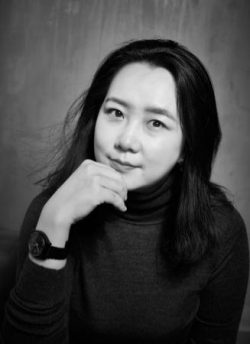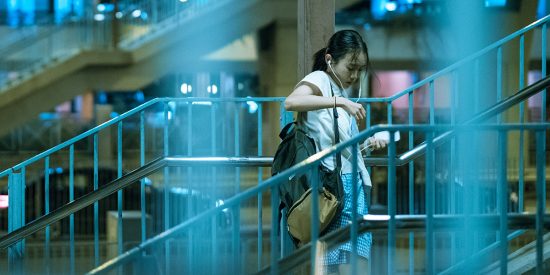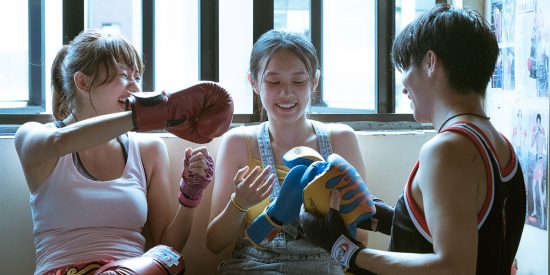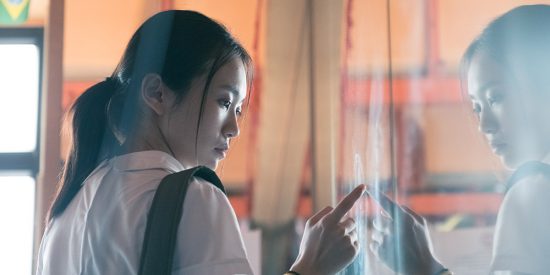Discovering The Crossing
Just before the World Premiere of The Crossing at the 43rd Toronto International Film Festival, Trevor Hogg talked with filmmaker Bai Xue and actress Huang Yao about their collaboration at the TIFF Bell Lightbox.

Bai Xue
Opening the Discovery programme at the 43rd Toronto International Film Festival was the feature directorial debut of Beijing Film Academy graduate Bai Xue called The Crossing; the story was inspired by 30,000 children from Shenzhen, China commuting to Hong Kong five days a week to attend school and focuses on a 16-year-old girl named Peipei (Huang Yao) who smuggles iPhones across the border to pay for a vacation to Japan with her best friend Jo (Carmen Soup). The script made the top five of the China Youth Film Director Support Program and gained the financial support of Wanda Pictures. “The movie is not based on a true story,” notes Xue who grew-up in Shenzhen and travelled many times to Hong Kong. “I focused on these cross-border kids and then realized that smuggling was exactly what they would do. The whole story was reshaped by the interviews I conducted with cross-border girls, and officials from Hong Kong and mainland China. There are so many details drawn from real life.” Distinguishing between the two environments was essential to the visual aesthetic. “The story is about the two cities so deciding how to present their cultural differences in a cinematic way was the biggest challenge for the shooting.”

Principal photography began in Hong Kong and concluded in China. “All of the scenes in Hong Kong were intense and emotional while the part shot in China is normal and peaceful,” states Xue. “This helped Huang to get into the emotion of the character.” Securing approval of custom officials to shoot scenes on the border was not easy. “You have to file a permission request to the related authorities to get their approval. Our film is the first one to be made at customs because these are sensitive areas. The border on the Hong Kong side is completely off limits so we had to choose another harbour to double for the city.” Yao is a graduate of Central Academy of Drama in Beijing and in her first lead role she had to portray a character eight years younger than herself. “I tried to distinguish the way that Peipei treats her friends and family; these are two different relationships in her life. Before the shooting started Bae had me participate in a Hong Kong middle school for about a week to get a real sense of being Peipei.” Casting for Peipei was made difficult as the part required an actress able to speak both Cantonese and Mandarin. “My friends introduced me to Huang Yao,” remarks Xue. “She was the most appropriate candidate.” Yao read the script twice and wrote some notes before meeting with Xue. “During my first audition Bae and I did not talk about Peipei but about myself.”

“The whole story begins with a simple wish to travel to Japan for a holiday to see the snow, later on Peipei has this seemingly dangerous job [smuggling iPhones] and at the same time has a potential romance with our lead male Hao [Sunny Son]; there seems to be so many beautiful bubbles but they are not real and vanish quickly,” states Xue. “By the end of the film she is not the same girl as at the start.” A key relationship is the sisterly friendship between classmates Peipei and Jo. “In order to build a bond between us, Bae had Carmen and I live in a dorm like roommates to get to know each other well,” remarks Yao. “I was initially afraid of Carmen as she is a powerful girl and a little bit older than me. Carmen was also great.” The actress was impressed by the intuition of her director. “Bae has an incredible sense of casting and could see through performance to know whether a person would be perfect for the role. I felt lour male lead was not exactly the type of person he presents onscreen but after the shooting started it felt just right. Sunny Sun is a gentleman. From my own perspective good casting already guarantees 50 percent of the success of the film.” A dramatic moment has a gun pushed against the temple of Peipei which emphasizes the dangerous nature of smuggling. That gun is not a fake. I was feeling real pressure by the actor who was holding the gun. He’s actually nice! The acting was natural.” Wetsuits were worn underneath the costumes for the downpour sequences. “There’s a core to each scene,” remarks Xue who co-wrote the screenplay with Lin Meiju. “As long as that was being correctly presented there was room for improvisation.”

Advance preparation was critical, especially, conducting principal photography in a city such as Hong Kong. “I scouted each scene with the cinematographer, Piao Songri [Rider on Ghost Street], twice or even more so I already had all of the shots in my mind,” reveals Xue. There are a couple of scenarios from the film that we used storyboards, like when Peipei drops the iPhone in the rain.” Cinematic references were not utilized to establish the visual language. “I wanted to create my own unique style.” Former college classmates of the director, Feng Yanming (Devil and Angel) and Gao Xiaoyang (The War of Loong) respectively looked after the sound design and composing. “They deeply understood the story deeply. There are many little details in the sound design. We recorded the sound simultaneously. 80 percent of the sound is from the real scene. The style of the score was what I listened to when working on the script which was piano and electronic house music.” Each pivotal moment for Peipei is marked with a freeze frame courtesy of editor Matthieu Laclau (Ash is Purest White). “The rhythm and tempo that Matthieu set for this film was his biggest contribution. There are many scenes that I wouldn’t let go but he insisted that we have to cut it out. Now we have the perfect runtime. It’s not too long. It’s not too boring. Everybody focuses on Peipei.” Yao believes, “The success of our film is that you get to have an inside look into the life of a seemingly regular schoolgirl.” The biggest challenge for me was the relationship she has with her mother in the film because I am close to my mother. It took time to understand that mother-daughter relationship.” A favourite scene for Xue is when Peipei and Hao strap iPhones onto each other. “It’s sexy! The sound was specially made to make the audience feel that it’s happening right beside your ear. You could almost hear them breathing.” Yao concludes, “I want the audience to see each and every scene so buy a ticket, go to theatre and watch the movie!”
Many thanks for Bai Xue and Huang Yao for taking the time be interviewed.
Trevor Hogg is a freelance video editor and writer who currently resides in Canada; he can be found at LinkedIn.









